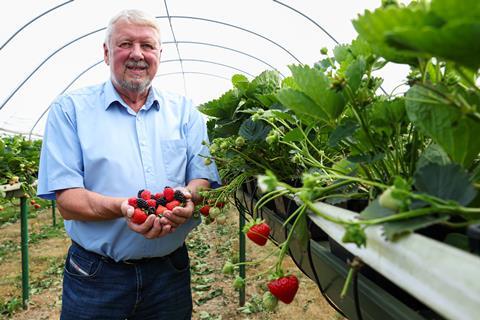Growers warn of difficult year to come despite the British berry sector hitting record milestones

British berry growers have warned of a tough year ahead as rising energy costs and wage increases continue to create challenging circumstances for fruit farmers in 2025.
A lack of fair retailer returns has also been cited by growers as a continuing issue, threatening the future success of the sector.
It comes despite the British berry market reaching a total market value of £2bn for the first time, according to British Berry Growers, the industry body representing 95 percent of British berries sold in the UK.
The industry’s growth has been largely fuelled by rising consumer demand, with berry sales volumes increasing by 4.3 per cent in the past year alone, with market penetration (the percentage of consumers buying berries) now reaching 85.3 per cent.
“We are immensely proud of reaching this milestone, and of the industry’s resilience in the face of challenging operating conditions,” said Nick Marston, chairman of British Berry Growers.
“But it is also clear that there are very tangible risks which threaten the industry’s future. In particular, it’s clear that retailers have a significant role to play in the industry’s recovery.
“Without their support, growers will struggle to expand production and meet the ever-growing demand for fresh British berries,” he continued.
”This would be a tragedy when the ongoing growth of the overall retail market gives a huge opportunity to increase our UK home production and self-sufficiency.”
The historic milestone marks nearly a decade of consistent market growth, which has seen the sector double in value since 2015, when the market first reached £1bn.
In the last year, the average year-round price of berries has increased significantly by 6.9 per cent, which has driven a significant portion of the industry’s value growth.
The berry market value milestone comes as a new EY report commissioned by British Berry Growers found that the British berry industry is having an outsized effect on the UK economy; in 2023, the industry added £624mn to the economy, as well as contributing £134mn in taxes, and supporting 16,317 FTE jobs.
Challenging conditions
However, despite reaching this £2bn milestone, the future success of the UK production industry is by no means secure, with conditions for growers becoming increasingly challenging.
According to the EY report, the rate at which the industry has grown has significantly decelerated in recent years, with the Compound Annual Growth Rate (CAGR) in the volume of berry sales dropping from 7.8 per cent between 2012 and 2019, to just 1.3 per cent between 2019 and 2023.
Reasons for this declining growth are primarily centred around the rise in the costs of production, such as rising energy costs and increases in the national minimum and living wage rates.
The National Living Wage rose by 59 per cent between 2016 and 2024, which is having an outsized impact on what is a labour-dependent industry.
In fact, 71 per cent of growers surveyed in the EY report experienced operating cost increases in excess of 20 per cent between 2020 and 2023.
For the vast majority – 85 per cent of growers – revenue returns did not keep pace with the operating cost increases.
Unfortunately, for the country’s berry producers, the industry’s recovery is not being sufficiently supported by fairer retailer returns, British Berry Growers said.
Though the average retail price of berries rose by 14.5 per cent between 2020 and 2023, the average price paid to growers by retailers only increased by 11.2 per cent in the same period – ”by no means” enough to help cover non-wage operating cost increases of 37 per cent on average.
British growers are also having to compete with more berries being imported from other markets.
Despite the overall market growth for British and imported berries in the UK, the share of British berries has shrunk by 2.54 per cent, while the volume of imported berries increased by 15.11 per cent.
“As we start 2025, it is clear that collaborative action is essential to ensure the survival and continued growth of the British berry industry,” added Marston.
“Retailers, policymakers, and industry stakeholders must come together to support British growers, through fairer pricing and extended access to a seasonal workforce, to ensure the future of one of the UK’s most important agricultural sectors.”
Figures in the article have been drawn from Kantar sales data and the EY report



